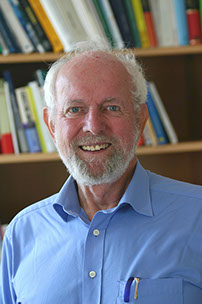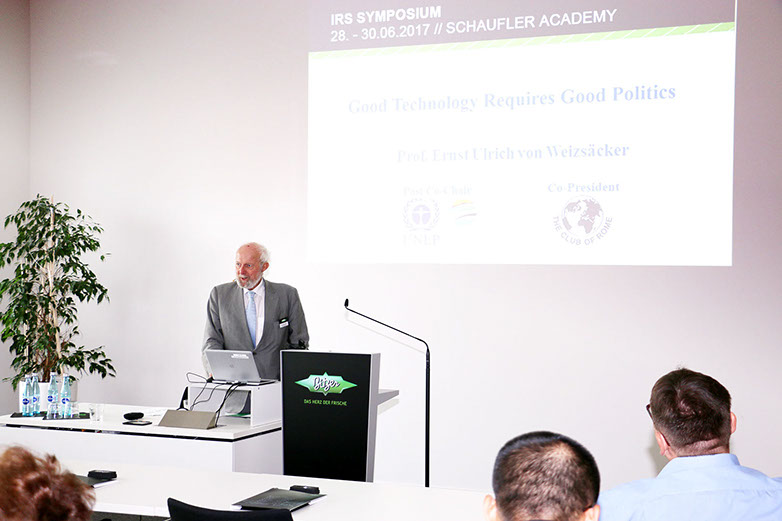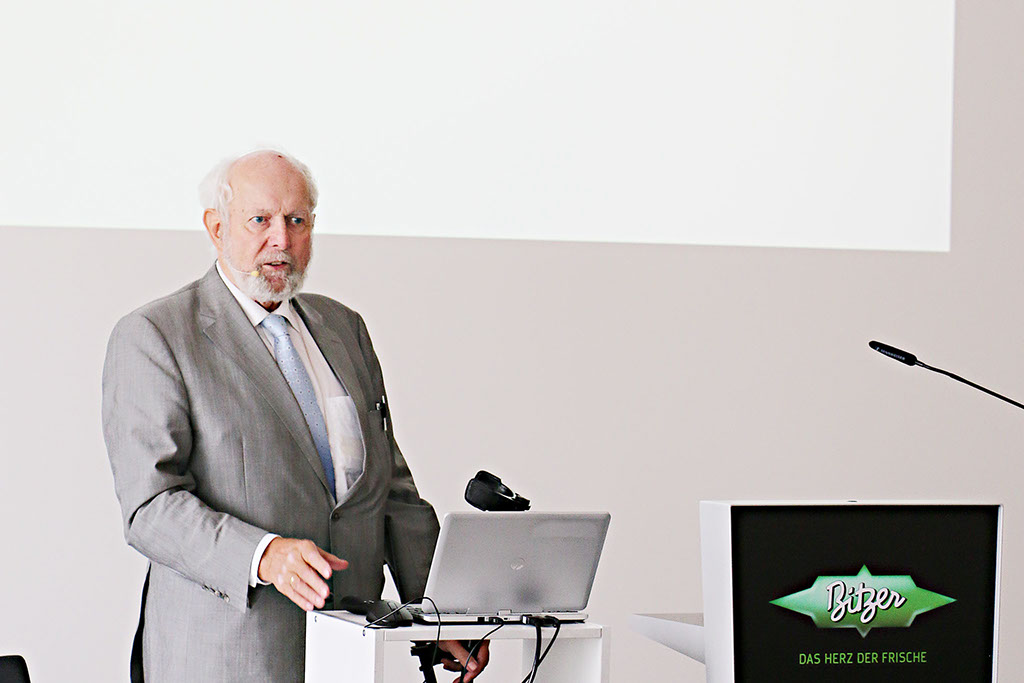Professor von Weizsäcker, many power stations around the world have remained connected to the grid for longer than originally planned. One of the arguments is that it is necessary to meet the demand for energy.
In today’s economy, it is rational because today’s economy is extremely inefficient. Try to picture it; just one quarter of a kilowatt-hour is enough to transport ten kilograms of weight from sea level to the summit of Mount Everest. So the potential of a kilowatt-hour is enormous. We are the problem: our efficiency is incredibly poor by comparison. We have to improve.

Biography
Born in Zurich in 1939, Ernst Ulrich von Weizsäcker is a natural scientist, German politician and Co-President of the Club of Rome since 2012. Having earned his PhD in physics, Ernst Ulrich von Weizsäcker was a member of the German Bundestag from 1998 to 2005, director of the Institute for European Environmental Policy from 1984 to 1991, director of the UN Centre for Science and Technology in New York from 1981 to 1984 and president of the University of Kassel from 1975 to 1980. The former President of Germany Richard von Weizsäcker was his uncle.
But why do we not tap this potential efficiently?
We waste energy. Simply put, it is too cheap at the moment. And when something is cheap, we are careless with it because we are no longer aware of its actual value. One example is the price of plane tickets. As they have become more cost-effective over the past few decades, the number of passengers and quantity of airfreight have increased. It has become affordable to fly to London to go shopping – although, in ecological terms, this is of course madness.
And how can our efficiency be improved?
One key factor is the price. It is not a bad thing when things are expensive as long as the price is reasonable. We should therefore unite on a political level to make energy and raw materials more expensive in multiple small increments. The rate should match the speed at which technological advancements are increasing productivity. Then what we use for energy will remain essentially constant. A social scale would be one option for low-income households.
Many people are sceptical of this.
It goes without saying that the price increase has to be moderate and affordable for citizens and industry. Then they will become part of the solution. In Sweden, for example, the government has introduced a high tax on airborne pollutants. However, companies receive the money back through the extra value created. If you cut harmful emissions and produce more, you will become richer. In doing so, the state is rewarding innovation. I imagine something similar with energy: we should raise energy prices gradually and could give the energy tax revenue collected from industry back to businesses on the basis of the extra value created. Innovative companies will fare better than before in financial terms and the overall economy will become increasingly efficient. Good for jobs and the environment.
What sectors would that affect?
Any sector in which a lot of energy is used – from lighting and engines to heating in buildings. There are already fascinating technological developments that are gaining recognition far too slowly because they are barely worth it financially. One good example is the passive house concept, which consumes almost no energy any more. If we converted all 20 million houses in Germany, we would almost completely meet our climate targets. The conversion process is taking place slowly because fuel oil is so cheap that it pays off after decades. The low price of fuel oil is harmful to the environment and innovation.
So we raise energy prices and that will solve everything?
No, it will only increase the motivation to save energy. And that will make more efficient technology economical. And then all we have to do is start using it. One key concept is the recycling economy. The recycling economy aims to use raw materials beyond the life cycles of individual products. Repairs and maintenance play a decisive role in the recycling economy because they save resources. We simply throw far too many goods away after we use them: in most countries, only around ten per cent of raw materials actually make it back into new products. So companies can make their contribution if they take sustainability seriously. BITZER is on the right path here: the specialist in refrigeration compressors has built up an outstanding global service and maintenance network in Green Point.
But do new products not operate more efficiently?
Yes, mostly. There is always a balancing act between innovation and longevity. I am also not advocating keeping dinosaurs alive artificially. But we can build long-life components in such a way that they are compatible with new product generations. Then they can be installed in new products.
We waste energy. Simply put, it is too cheap at the moment. And when something is cheap, we are careless with it because we are no longer aware of its actual value.
How can refrigeration be made more energy-efficient?
Well-insulated houses make a significant contribution to the climate control of buildings. Ultimately, they heat up much less in summer and, as such, are passively air conditioned. But it is more than a question of passive houses. Generally speaking, any advancement that improves energy efficiency should be welcomed.
Let us look to the future: all aspects of resource-efficient production can be grouped under the umbrella term ‘environmental protection’. So can we predict how it will look?
Naturally, I cannot see the future. However, we have the empirical Kuznets curve from the Nobel prizewinner Simon Kuznets: historically, countries start poor and clean. Then comes industrialisation and they become wealthy and dirty. Ultimately, they become so rich that they can afford expensive environmental protection, and then the pollution decreases. And that can be transferred to resource elegance in the future.
How so?
Initially, we use the few available resources sparingly – then comes the large quantitative expansion and the throwaway society. At some point, we will wake up and realise that this is madness. Then we will start to make our economy more resource-efficient. That will be the transition to the recycling economy.
And where are we at the moment on the Kuznets curve?
In Germany, we are beyond the turning point. But many emerging economies and developing countries are not in the same position. They are still dominated by local pollution. If we really want to limit climate change, industrialised nations and developing countries alike must rapidly accelerate in the direction of energy efficiency, renewables and a recycling economy. Politicians and the media always make excuses based on so-called ‘demand’.
What do you mean by ‘so-called demand’?
I do not think the need to waste energy is real demand. Remember the quarter kilowatt-hour and Mount Everest. If we really lived energy efficiently – from our washing machines to transportation and agriculture – then we would presumably need just one quarter of the energy we currently consume. Substitution can also play a role in improving efficiency – for example, replacing the metal in vehicles and planes with carbon fibre. This cuts fuel consumption.

If society really wants something, then technology is able to offer solutions incredibly quickly and effectively
This way, we can call for industry to change its mindset on a major scale. What could motivate them to make their manufacturing processes more sustainable?
The major technological trends of the past were always driven by society. And as with environmental protection, engineers often have ideas and strategies up their sleeves that they have so far been unable to make a reality because the issue still does not bear enough significance in public debate. This is essentially a trivial conclusion but it is significant: if society really wants something, then technology is able to offer solutions incredibly quickly and effectively. Unfortunately, the industrial lobby sometimes acts as if every technically feasible option has already been exhausted. Objectively, this is wrong.
What exactly makes energy efficiency such an urgent issue now?
I will give you a basic example: by 2020, the European Union wants to meet 20 per cent of its energy requirements with renewables. This will affect 500 million people. If we optimistically assume that the other OECD (Organisation for Economic Co-operation and Development) countries implement this analogously, then we can expect it to affect another 500 million people. So we are talking about a billion people.
That sounds very promising.
Yes, it does. But what is that worth on a global scale? One billion is one seventh of seven billion, and 20 per cent is one fifth of 100 per cent. If we want seven billion people to consume energy in the same way as Americans do, we would have to increase renewables by a factor of 35. Ecologically speaking, that would be insane with corn or palm oil, hydroelectric power or even wind power. In contrast, it would be tremendously wise to finally wake the sleeping giant that is efficiency.
These are global issues that only nations and international organisations can face. But can an individual contribute?
Yes, of course. We should change our lifestyles and stop wasting so many resources. If we replace functional mobile phones only once every four years instead of every two, we would double our resource efficiency with no significant impact on our quality of life. Or press on in favour of passive house. Or ecological foods. Every family can make a contribution there.


